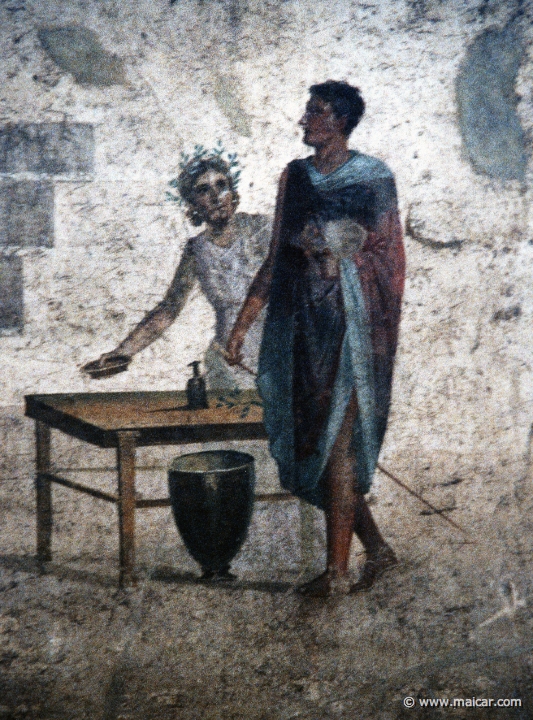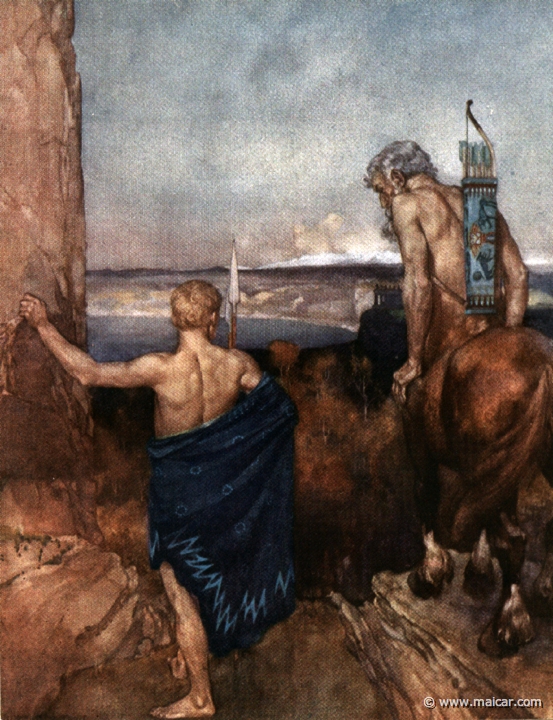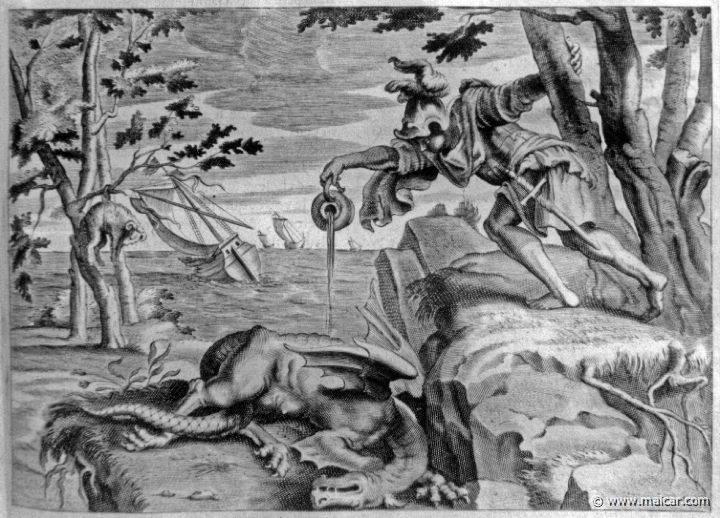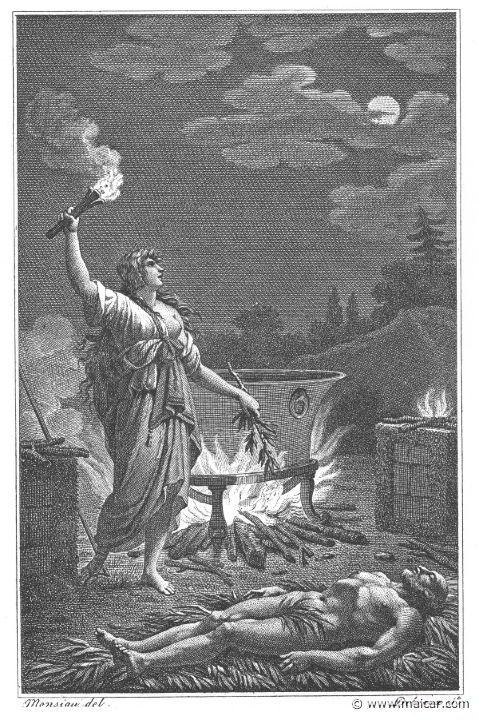|

|
Jason arriving to the palace of Pelias 1. Jason recognised by Pelias and his daughters (detail). Pompei, casa di Giasone o dell'Amor fatale (IX 5,18), triclinio (f). National Archaeological Museum, Naples.
|
|
Jason is the admiral of the ARGONAUTS. He fetched
the Golden Fleece in Colchis, and returned with the
Colchian princess Medea,
whom he married. Later, however, it occurred to him
that such a brave, handsome, and noble man as
himself should not have as wife a foreigner and
sorceress such as Medea, and that is why he had the fatal idea of marrying the younger Corinthian princess Glauce 4.
Political background of Iolcus
Jason's father Aeson was himself the son of Cretheus 1, the founder of Iolcus, a city in Thessaly on the coast of the Gulf of Pagasae. His mother was Tyro, daughter of Salmoneus and Alcidice, but she, they say, consorted with Poseidon, giving birth
to the twins Neleus and Pelias 1. As this had
been done secretly, Tyro abandoned them, and when
they were exposed, a horse keeper found them and
saved their lives. This is why the twins were
reared by Sidero, who was Salmoneus' second wife,
and notorious for having treated her stepdaughter
Tyro very unkindly. When the twins were grown up,
they discovered the truth about their mother and
attacked Sidero, who took refuge in the precinct of Hera to no avail, for Pelias 1 killed her on
the altars, thus incurring the hate of the goddess.
Now, whereas Neleus, in
connection with these events, was banished and came
to Messenia in the
southwestern Peloponnesus, Pelias 1 succeeded King Cretheus 1 in the throne of Iolcus, robbing his brother, or half-brother Aeson, of his royal rights.
Jason comes out of Chiron's cave
When Jason was still a child, he was secretly
sent away by his dispossessed parents to be reared
by the wise Centaur Chiron, with whom he
stayed twenty years. When that period had elapsed,
Jason came out of Chiron's cave determined to restore the power to his father, and as it appears, he was received with great joy, not only by his parents, but also by other relatives such as Pheres 1, the founder of Pherae, Amythaon 1 from Pylos, and their children Admetus 1 and Melampus 1, Jason's cousins. And all this men came to meet King Pelias 1, to let him
know their opinion about the matter of power in the
city of Iolcus.
Jason's claims
In this meeting Jason explained to Pelias 1 in which way
things should be arranged if civil war was to be
avoided; he said:
"It is not
right for us to resort to swords of sharp bronze or
spears in dividing the great honors of our
ancestors. I leave you the flocks, and the golden
herds of cattle, and all the fields, which you
keep, having stolen them from my ancestors, feeding
fat your wealth; and it does not grieve me that
they provide for your household beyond all measure.
But as for the royal scepter and the throne, in
which Aeson son of Cretheus once sat, and dispensed
straight justice for a nation of horsemen: without
any distress between us, release these to me, lest
some more disturbing evil arise from them." (Jason to Pelias 1.
Pindar, Pythian Odes 4.149).
It was then that Pelias 1 asked Jason to sail to Colchis and recover
the Golden Fleece, which was held by King Aeetes.
The Golden Fleece
This Golden Fleece was the hide of the Ram on
which Athamas 1's son Phrixus 1, flying through the sky, had come to Colchis. The Ram itself was the offspring of Poseidon and Theophane,
whom the god carried off, changing her into a ewe
and himself into a ram. When Athamas 1's second wife Ino plotted against the children of his first wife Nephele 2, Hermes provided the Ram with the Golden Fleece so that Phrixus 1 and his sister Helle could safely leave the kingdom. Helle, however, fell into the sea which was named Hellespont after her and drowned, but her brother came to Colchis.
|

|
rus069: Jason and the Centaur Chiron. Painting by William Russell Flint (1880-1969). Charles Kingsley, Grekiska Hjältesagor (1924, Swedish Edition of The Heroes). Paintings (watercolors) from 1911.
|
|
Zeus' curse
On his arrival, Phrixus 1 sacrificed the Ram to Zeus, giving the Golden
Fleece to King Aeetes,
who nailed it to an oak in a grove of Ares. Some have said that Aeetes killed Phrixus 1, but others affirm that Phrixus 1 married Aeetes' daughter Chalciope 2, and after having many children by her, he died in Old Age. In any case, what happened to Phrixus 1, that is, the plot against him and the need to leave his country and go into exile, proved to be both a shame and a curse for the whole house of Aeolus 1. For it was
said that Zeus had promised
that no one in this family would escape his wrath
until the Golden Fleece returned to Hellas.
King Pelias 1's
proposal
King Pelias 1 argued
that he knew these things because he had asked the
Oracle at Delphi, and he
added that if Jason would willingly fulfil this
quest, bringing back the Golden Fleece, he Pelias 1 would, in
exchange, deliver up to him the royal power and the
kingdom. And he made an oath that he would do as he
promised, invoking Zeus as
his witness. This is how Jason's claims upon the
throne of Iolcus were postponed, and instead he
started sending messengers to every corner of
Hellas in order to gather the men that were to take
part in the expedition, and that later were called ARGONAUTS after the
name of their ship.
More about Jason's arrival to Iolcus
Others (for poets as well as mythographers often
dissent) have described the meeting between Pelias 1 and Jason
differently. Pelias 1,
some say, who had ruled the country from his
earliest years, was, when he met Jason, an old man
with no rest in his mind; for seers had prophesied
that destruction would come upon him through
Aeson's son. And they say that Pelias 1 commanded his subject Jason to sail to Colchis as a way of getting rid of him. Others have said that an oracle told Pelias 1 that his death
was drawing near if a man wearing only one sandal,
arrived. So when Pelias 1 was making his yearly offerings to Poseidon, there arrived
Jason to make sacrifice, after having lost his
sandal when crossing the river Evenus, which is in
Aetolia (or perhaps the river Anaurus, which is in
Thessaly). It was after noticing the missing
sandal, they say, that Pelias 1 ordered him to
procure the Golden Fleece from his enemy King Aeetes of Colchis. Jason
had left his sandal in the mud of the river by the
will of Hera, who arranged
everything in order to destroy King Pelias 1, the man that
had outraged the goddess' shrine, when punishing
his stepmother Sidero. It is also told that Hera was waiting near the river, disguised as an old woman and testing men's minds, to see if there would appear someone to carry her across the river, and that Jason, helping her, lost his sandal. Yet others affirm that Pelias 1 asked the man
with the single sandal what he would do if he had
received an oracle that he should be murdered by
one of the citizens. Jason then replied that he
would command him to fetch the Golden Fleece, and Pelias 1, on hearing the
answer, bade him to go in quest of this interesting
item. It has been added that it was Hera who put that words in
Jason's mind and mouth, for the goddess knew that
Jason was fated to bring the witch Medea to Hellas and that
she would prove to be a curse for Pelias 1, the man who
outraged her shrine. This is why Jason was dear to Hera.
Jason gathers the ARGONAUTS
In any case, after gathering those best men of
his time who came to be known as the ARGONAUTS, Jason
persuaded King Pelias 1's young son Acastus to come with him. For in that way—that is, with his son undergoing the same perils and fortunes—the king would not set himself against the expedition, nor wish its failure.
Lemnos
|

|
Jason and the Colchian dragon. Les METAMORPHOSES D’OVIDE EN LATIN ET FRANÇOIS, DIVISÉES EN XV LIVRES. TRADUCTION DE Mr. PIERRE DU-RYER PARISIEN, DE L’ACADEMIE FRANÇOISE. MDCLXXVII.
|
|
Having sailed from Iolcus (today called Volos), Jason and his ARGONAUTS came first
to the island of Lemnos,
where the Lemnian women had killed their husbands
and all males in Lemnos because of their having taken Thracian wives. They also had deposed King Thoas 3, who would have followed the other Lemnian men to Hades, had not his daughter Hypsipyle, who was now appointed queen, secretly spared him and hidden him. When the ARGONAUTS arrived to Lemnos, the
women loaded them with lies, saying that their
husbands had moved to Thrace with their new wives.
And as they realised that there was no future for
them without men, and also because they feared
invasions, the Lemnian women invited the ARGONAUTS to stay with
them. That is why the visitors remained in the
island, enjoying the hospitality that the women
offered, both in bed and otherwise. And so, having
conquered through love and not through weapons, the ARGONAUTS obtained
great pleasure during their sojourn in Lemnos, forgetting all
about the Golden Fleece, Zeus' curse against the
house of Aeolus 1, and
all other matters that, until then, had been their
ambition, their honor, their duty, and their quest.
Watching the ship is not fun
Some say that Heracles 1, who had been left watching the ship,
reproached his comrades, ironically wondering
whether they had left their countries in want of
marriage, but others assert that it was Tiphys who
admonished them. In any case, Jason decided to
leave with his ARGONAUTS, probably
after a couple of years; for he had two sons by
Queen Hypsipyle.
Aeetes' test
When the ARGONAUTS,
after several adventures, came to Colchis, Jason's
courage and abilities were put to the test by King Aeetes, who invited him
to yoke the brazen-footed bulls that breathed fire
from their jaws, and with their help plough the
field of Ares where he was
to sow from the half of the Dragon's teeth which Aeetes had got from Athena, after the killing
of the Boeotian dragon by Cadmus years ago. From
these teeth, and in the same way as the SPARTI were born in
Boeotia, armed men would grow up from the earth;
and these Jason had to slay when they would rise
against him on all sides.
Medea helps the lovely
stranger
These were difficult tasks, but the gods,
wishing to punish King Pelias 1 back home, made
King Aeetes' daughter Medea fall in love with
the stranger. And as she was, not just a princess
but also a priestess and a witch, she found the way
to help Jason, not only to meet Aeetes' challenge, but
also to steal the Golden Fleece. In exchange for
such invaluable services, Jason promised Medea to take her to
Hellas, and there marry her and never dishonour her
for want of kinsmen.
|

|
7110: Medea, Ercolano. National Archaeological Museum, Naples.
|
|
What Medea did for Jason
Many things did Medea for the sake of this handsome young man, so that
he, escaping all dangers and performing great
deeds, would become mighty and famous. For she
betrayed her country and her father, helping Jason
to cope with the brazen-footed bulls and the sown
men, and leading him to the Golden Fleece, which
was guarded by a sleepless dragon, whom she lulled
to sleep by art and drugs. And when they left
Colchis pursued by the fleet of Aeetes, she murdered her
own brother Apsyrtus, and having cut him limb from
limb, cast the pieces into the sea, so that Aeetes, gathering
Apsyrtus' limbs, would fall behind in the pursuit.
And if she did not perform this terrible deed, as
others say, she nevertheless helped her lover to
get rid of Apsyrtus, sending him to the next world
in one way or another. And when the ARGONAUTS came to Crete, she destroyed the
warder of the island Talos 1, who was made of bronze and was invulnerable,
by drawing out a nail, so that all the ichor gushed
out and he died. On their return to Iolcus, some say, Medea restored Jason's
father Aeson to youth; and having deceived King Pelias 1's daughters, she had the king cut into pieces.
How Jason paid back
|

|
villenave01225: Medea revives Aeson. "Medea, with streaming hair after the fashion of the Bacchantes, moved round the blazing altars ..." (Ov. Met. 7.257). Guillaume T. de Villenave, Les Métamorphoses d'Ovide (Paris, Didot 1806–07). Engravings after originals by Jean-Jacques François Le Barbier (1739–1826), Nicolas André Monsiau (1754–1837), and Jean-Michel Moreau (1741–1814).
|
|
This is how Jason achieved all his aims.
However, for the murder of Pelias 1, Medea and Jason were
expelled from Iolcus by the king's son Acastus, and
came as husband and wife to Corinth, where they
lived happily for ten years. When this time passed,
Jason discovered that what is advantageous in some
situations may be a drawback in others. Medea, he reasoned, was
useful in time of trouble, because of her strength
and skills; but now, leading the life of peaceful
citizens of Corinth, she could be seen rather as a foreign barbarian and an aged witch. This is why Jason, eager to build up a brilliant future for himself and his children, forgot all his promises and decided to get rid of her lawful wife and benefactress, by marrying the younger princess Glauce 4, daughter of King Creon 3 of Corinth.
How Medea ruined him
However, this never happened. For Medea sent a robe steeped in poison as a wedding gift, and when Glauce 4 had put it on, she was consumed with fire. Also her father Creon 3 died when he tried to rescue his daughter; for he fell upon his daughter's corpse and could not separate from her, as his flesh was torn from his bones when he tried to rise. And not satisfied with these deeds, Medea killed her own
children by Jason, in case he had not yet
understood how much he had risked and lost by
betraying her.
Wife of Acastus plots against Peleus
Now, it has been said that when Acastus became king of Iolcus, his wife Astydamia 3 fell in love with Peleus (later father
of Achilles) and sent
him a proposal for a meeting but he refused. She
then, feeling scorned, sent a word to Peleus' wife Antigone 1, daughter of King Eurytion 2 of Phthia, the man who purified Peleus of a murder, giving him his daughter and the third part of the country. In her letter Astydamia 3 explained that Peleus was about to marry Sterope 5, her own daughter by Acastus. When Antigone 1 received the message she killed herself.
Jason or his son back in Iolcus
But when Jason attacked Iolcus, helped by Peleus and the DIOSCURI, Peleus slaughtered Astydamia 3 and divided her limb from limb on account of her ugly trick. Jason might have taken the throne of Iolcus at this time, or else his own son by Medea, Thessalus 2, became king.
Death in some way or another
After these events, Medea was forced to escape
and came to Athens, where
she married King Aegeus 1. But Jason, some say, being unable to endure
the loss of both wife and children, killed himself.
Yet others have said that Medea foretold him a foul
death: the wreckage of the Argo would fall upon
Jason and kill him.
|